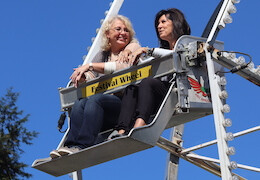Graduate education teacher endorsement courses obtained at Southern Wesleyan University can assist education professionals as they seek to enhance their professional training. These courses are offered fully online and can be taken in addition to the MEDCL program or as stand-alone courses.
- Completion of the coursework could lead to an emphasis content area that could lead to an add-on endorsement for those professionals with a teaching certificate.
- Credits can count towards teacher's renewal credits for teacher certification renewal.
- The additional coursework may allow an individual to teach at a technical college or four-year college or university as they have earned enough content emphasis credits with a Master's degree and the 18 graduate hours in the specific area.
- Elective coursework could count toward Bachelor's plus 18 or a Master's plus 30.
2023-2024 COURSE SCHEDULE (PDF)
Cost
Visit our Tuition and Fees page for specific program information. Contact the SWU Online Enrollment Team at 877-644-5557 or for special pricing options for school districts.
How to Enroll
To enroll, please download and complete this registration form and follow its instructions.
For more information, please contact the Office of Academic Records at or 864-644-5530.
Financial Aid
Some school districts will offer tuition reimbursement. For current MEDCL students, elective coursework is NOT eligible for Title IV federal aid, but it is possible that current MEDCL students could apply excess loan funds to cover elective coursework. Private Educational Loans may be an option. You can explore lender options and their distinct, specific requirements here. For more information, please contact a Financial Aid representative.
Want to know more?
Request more information.
Disclaimer
The guidelines for renewing or adding an endorsement to your South Carolina Educator Licensure are established by the South Carolina Department of Education. Contact the South Carolina Department of Education for individual course requirements for licensure renewal and add-on endorsements. Licensure and renewal requirements may change due to changes made by the South Carolina Department of Education. It is the candidate’s responsibility to be aware of changes and his/her course needs.
Individuals from states other than South Carolina must contact their state department of education for audits of transcripts and course requirements unique to each state.
Content Area Endorsements
Teacher Leader Endorsement
The three courses and observational experience required for the Teacher Leader endorsement are already built into the M.Ed. in Classroom Leadership program (EDCL 5373, EDCL 5183, EDCL 5493). You can also drop into these individual courses. You can learn more about this endorsement here.
This course focuses on the teacher’s role as leader not only in their classroom, but also school-wide. Many leadership opportunities exist at the building level which do not require administrative certification, but which are nonetheless vital to the effective operation of a school: department head, program or project coordinator, faculty mentor, and others. This course prepares teachers to oversee curriculum and manage projects to achieve school goals, use evaluation to improve programs, coach and mentor faculty, and develop a school’s leadership capacity. The Professional Leadership and Mentoring course will have as a component a requirement that the participants complete the CERRA sponsored South Carolina Foundations in Mentoring. The course includes a 12 hour field experience.
This course introduces contemporary philosophy of education as an academic discipline, including the study of language analysis, argument analysis, conceptual analysis, as well as examination of ethical issues related to contemporary education.
This course is designed to develop teachers as instructional leaders in the planning, implementation and evaluation of school-wide curriculum and instructional initiatives. As teachers continue to expand their expertise beyond the classroom, new roles in teacher leadership have emerged specific to the monitoring and assessment of school-based instructional programs. Teachers function as members of leadership teams, chair data committees and coordinate school-wide teaching and learning activities. This course examines the concepts, theory, and practices in curriculum development and prepares teacher leaders with the knowledge and skills necessary to research, refine, and implement curriculum and instructional practices that increase student achievement. The course includes a 12 hour field experience.
This course is a study of the methods and instruments used to assess student success, including consideration of educational tests and measurements, alternative assessments, portfolio assessment, and performance assessments. Much of the content of this course will translate into improved assessment practices in the classroom teachers. The course includes a 12 hour field experience.
Instructional Design - Microcredential
The examination of the instructional designer’s tasks and skills needed to assist professionals to attain and maintain a desirable learning and teaching situation for all e-learners. Best practices for e-learning will be explored.
Students will learn about instructional technologies including learning management systems using Canvas. Canvas will be compared and contrasted with industry leading learning management systems. Students will learn how to create an online classroom for both synchronous (“real time”) and asynchronous instruction. Learners will also explore systems administration in order to participate effectively as a member of an instructional support team. This course will give you an excellent preparation to master any modern LMS including Blackboard, Moodle, Canvas, and many others.
Theoretical and practical foundations are explored to empower visionary leaders with the required innovative, culturally-responsive knowledge/skills required to thrive in a variety of socio-economically and/or geographically diverse organizations, such as K-12 schools, non-profit organizations, universities, libraries, manufacturing, health industries, and museums.
Explores the use of a range of formal in informal assessment methods to plan for e-instruction, to monitor and evaluate student progress, to involve students in the assessment process, and to report student achievement to various audiences. Emphasis will be placed on Quality Matters concepts.
Literacy - Read to Succeed Endorsement Coursework
Learn more about the Read to Succeed courses at SWU
This is a R2S course designed to give an overview of reading and its curricular implications for Read to Succeed. Emphasis is placed on current theoretical and evidence-based foundations in place for the reading and writing processes and instruction. All participants will recognize theories in reading and writing; explain language and reading development; have knowledge and demonstrate understanding of proven strategies; exhibit affirmative dispositions related to their own reading and writing; and understand external influences on the policies regarding reading. The continued importance of professional learning and leadership as a career-long process is stressed. This course will emphasize the following SC Literacy Competencies for PreK-5th grade: Standard 1- Foundational Knowledge; 6- Professional Learning and Leadership. Includes a 12 hour practicum.
This is a R2S course designed to assist participants broaden and deepen their understanding of the reading and writing progression with assessment and evaluation of the reading and writing processes. Participants will have a repertoire of different types of assessments and their characteristics; formative and summative assessments and the administration and interpretation; the use of assessment information to plan, evaluate, and adapt instruction; and the communication of assessment results and implications to varied audiences. This course will emphasize the following SC Literacy Competencies for PreK-5th grade: Standard 3-Assessment of Reading. Includes a 12 hours practicum.
This is a R2S course designed to demonstrate to participants instructional approaches and materials that will assist with implementing an integrated, comprehensive, and balanced curriculum to support student learning in reading and writing in K-5. The participants will be able to design and implement a complete and balanced curriculum while using content knowledge; implementing appropriate and a variety of instructional strategies; understanding the value of the K-5 student’s background and prior knowledge; making connections for reading and writing with other disciplines by integrating instruction; using a variety of texts and formats; organizing instructional time based on proven best strategies and scaffolding for both oral and written language; encouraging students’ communication by introducing and building vocabulary for K-5 students; encouraging fluency in reading through practice with varied texts. This course will emphasize the following SC Literacy Competencies for PreK-5th grade: Standard 2-Curriculum and Instruction. Includes a 12 hours practicum.
Also one of the following courses:
This course is a R2S course designed so 6-12 teachers can acquire strategies to improve student reading comprehension and writing skills. Class members will participate in activities and strategies to help students be better able to read and understand information content area material and ideas and writing. This course will emphasize the following SC Literacy Competencies for Middle and Secondary: Standard 1: Foundational Knowledge; Standard 2 Curriculum and Instruction; Standard 3: Assessment and Evaluation; Standard 4- Diversity; Assessment 5-Literate Environment; Standard 6-Professional Learning and Leadership. Includes a 12 hour practicum.
This course is a R2S course designed so K-5 teachers can acquire strategies to improve student reading comprehension and writing skills. Class members will participate in activities and strategies to help students be better able to read and understand information content area material and ideas and writing. The participants will be able to recognize and build the instruction on the K-5 students’ cultural and linguistic diversity including special needs and dual language learners; be an advocate for impartiality; optimize the use of both print and digital media; support practices that foster reading; This course will emphasize the following SC Literacy Competencies for PreK-5th grade: Standard 4-Diversity; Assessment 5-Literate Environment; Standard 7-Dual Language Learners (English Language Learners). Includes a 12 hour practicum.
Learning Disabilities
Introduces pre-service teachers to the diverse needs of exceptional children. Included in study will be characteristics of various exceptionalities, including but not limited to learning disabilities, emotional/behavioral disorders, mental impairment, hearing impairment, visual impairment, gifted and talented, Autism, and other handicapping impairments including attention deficit/hyperactivity disorder. The aim of the class is to provide information about laws and regulations governing special education, procedures and methods for teaching students with exceptionalities including the development and implementation of Individualized Educational Plans, and strategies for adapting curriculum and materials for students with exceptionalities in the regular classroom.
Concepts and methods of assessment in special education with emphasis on administering, scoring, and interpreting standardized educational tests. Major topics covered are Response to Intervention, recent research on assessment practices, accommodations and modifications, the role of families in the assessment process, students with diverse cultural and linguistic backgrounds, standardized instruments, curriculum based assessment, interpreting tests and writing reports, assessment of young children, and transition assessment.
Designed to provide students, who are currently teaching or who plan to teach, with the knowledge and disposition to successfully provide service to individuals who have been identified as having learning disabilities. Students will explore the moral, ethical, legal, and practical foundations involved in the identification of and provision of services to an individual with learning disabilities with a specific focus on Tier 1 and Tier 2 interventions. In addition, they will develop appreciation and respect for the opportunities and challenges faced by all stakeholders in an individual’s life and will be able to promote collaboration as an integral part of provision of services.
This course is designed to provide knowledge of methods, materials, and current research related to instructing and improving outcomes for students with learning disabilities.
This course provides practical experience in teaching students with exceptional learning needs in a special education setting under the supervision of university faculty and local mentor teachers. Students will complete a minimum of 30 hours of field experiences in a public school special education classroom. Prerequisites: EDSP 5233 Characteristics of Learning Disabilities and EDSP 5243 Methods of Teaching Students with Learning Disabilities.
This course examines research-supported techniques that teachers can use in working with learners in the general classroom and with exceptional learning needs and whose behavior interferes with their success. These students include children and adolescents with problems related to sustaining attention, hyperactivity, pragmatic language skills, aggression, and oppositional defiance. Participants will learn to: (1) differentiate problem behaviors through understanding potentially contributory factors; (2) develop age-appropriate interventions suitable for use in classroom and small-group settings; (3) develop and apply positive behavior plans and other data-driven decision-making techniques for evaluating the effectiveness of interventions. An understanding of professional ethical guidelines, relevant state and federal laws and regulations, and the importance of developing students' self-management skills will also be emphasized.
Diagnostic and remedial procedures in reading and writing as well as trends and issues in content area literacy will be discussed for struggling readers, English as a Second Language readers and special needs readers. Planning for literacy issues in various content area classrooms as well as diagnostic practices and recommendations are considered.
Gifted and Talented
An introduction to the field of gifted education including a history of gifted education, theories of intelligence, definitions of giftedness, methods of identification and a variety programming options in the conventional classroom/school setting. Practical aspects include the development of IEP’s, learning styles assessments, interest assessments, and management plans.
A study of the theoretical and practical aspects of curricular experiences for gifted and talented students. Examines instructional models, to encourage a critical understanding of how principles and practical procedures are set forth in teaching models.
Early Childhood Special Education
This course is designed to provide a broad overview of the characteristics, assessment techniques, methods of intervention, natural environments, community and family resources, and current issues of children from birth to age eight with diverse abilities and disabilities. The focus is to increase the awareness and understanding of individual needs and strengths in an early childhood and after school setting.
This course is an examination of the developing special needs child in a historical and current societal context focusing on the interrelationship of family, school and community. The process of socialization and identity development will be highlighted, showing the importance of respectful, reciprocal relationships that support and empower families.
This course applies critical and reflective thinking to observation and assessment of young children with disabilities development. It also prepares teachers of young children with disabilities to use observation, documentation, and interpretation strategies to improve program quality in early childhood settings.
Focuses on various developmental and individual needs of young children with disabilities as related to group settings, curriculum decisions, and the design of early learning environments. Emphasis is on current issues, the role of the caregiver (family and/or teacher), the process of guiding and teaching, and the facilitation of development and learning of young children who are culturally, linguistically, and ability diverse.
This course focuses on guidance and discipline of young children with disabilities through examination of theories, research and practical application for teachers in early childhood special education classrooms and parents at home. The course includes strategies for understanding and responding to special need children's behavior in ways that are congruent with the core values of early childhood education. Concepts of guidance relating to typical and atypical development, culture, and environment will be presented. Developmental stages of children's behavior, positive guidance strategies and teaching social-emotional skills are included.
This course provides practical experience in teaching early childhood students with exceptional learning needs under the supervision of university faculty and local mentor teachers. Students will complete a minimum of 36 hours of field experiences in a public school early childhood special education setting.
An introductory course to human growth and development from conception through the different life stages. Will emphasize physical growth, cognitive development, personality development, and social interactions.



